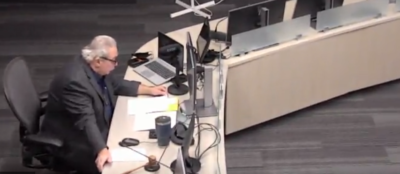 By Pepper Parr
By Pepper Parr
December 15th, 2020
BURLINGTON, ON
The last council event for the year takes place this morning.

Angelo Bentivegna serving as chair during a virtual council meeting
Not surprisingly the focus of the workshop that will be chaired by ward 6 Councillor Angelo Bentivegna will be transit and how the city plans to create a system that will get people out of their cars and into some other mode of transportation.
A deeper look into the Integrated Mobility Plan is the only item on the agenda.
There was an exceptionally informative workshop a number of weeks ago that featured four speakers getting to the public via Zoom. They did some of the groundwork that is going to be needed to bring about the scale of change that is going to be necessary if people are going to be able to get around.
The Gazette will be covering the workshop.
The vision statement being used is certainly strong enough – can they make it stick and deliver on it is the challenge.

A strong vision – delivering on it will be the challenge





















Yes, Philip. You’ve got me pegged. I’m simply a political operative. A shill. Not a human being, a resident, a parent, or a concerned taxpayer. There is absolutely no point engaging further with someone who simply assumes malevolence.
What world do these fuzzy-thinking social engineers live in? Did they ever talk to the actual residents to find out what is truly important to them? Here’s my take on mobility–transportation has to be convenient and time-efficient. If you don’t come up with a solution which meets those two criteria, you are wasting your time and taxpayer dollars.
Problem with that is there are tradeoffs to everything. Increasing the convenience and time-efficiency for one user often results in decreasing the safety or convenience for another.
It’s my view that life & limb should be the absolute top priority – not convenience or speed/efficiency. I’m sure all of us would choose to keep our families safe first.
There’s also an aspect of supply and demand. We have supplied a transportation system that serves people in cars very well, others less so. The result is an extremely high demand for car travel, which turns into gridlock during peak periods, causing frustration for all.
Meanwhile we experience extremely low demand for other less costly (in terms of financial cost, environmental cost, physical space) forms of mobility.
We also bear the burden of maintaining the transportation system we have, there is enormous expense in upkeep and winter control which falls upon the taxpayer. A large percentage of our city’s and our region’s capital and operating budgets are allocated to pay for roadways, and even that is nowhere near enough to deal with the backlog of necessary repairs, let alone expand it to accommodate growth.
Change is inevitable – either we need to be prepared to pay much higher taxes to continue providing all-car mobility, or we need to start making non-car modes of travel substantially more useful to people. This is what the integrated mobility plan is all about – getting that balance right.
Chris, hate to challenge your true-religion of cycling, but cycling will never be more than a recreational activity in the City of Burlington. I think it’s a great activity and we should endeavour to facilitate the safety of your fellow devotees, but I’m not seeing any numbers on our streets, my estimate is less than .75% of all road users on a daily annualized basis, that actually use cycling for transportation. I’m a firm believer in the philosophy of Star Trek, “the needs of the many outweigh the needs of the few”.
I concur with Phillip. Your argument of alternative modes of transportation still require pavements that are properly maintained.Unless we all start flying around with jetpacks, buses and bikes will require road maintenance along with cars. Preserving the health and safety of people is definitely at the top of the list. I am for cars, buses and all forms of motorized ride sharing to take to the busy streets. Bikes and walking require their own dedicated avenues. Further investment in the hydro corridors is the best start. Potentially eliminating some road arteries to vehicles may be another added value. Modifying Burlington’s service roads to get cyclists moving quicker is another area to look at. Unfortunately, I do not see much return on investment for cycling. In the winter it is dangerous to cycle in slush and ice. Very few able bodied people would venture out. As this city is by all demographic research an old population and getting older, cycling will never be at the top of the list for any large capital outlay.
Philip. while my comment was not specifically focussed on cycling, I’ll respond to this, because the existence of people riding bicycles for transportation seems to be a sore point for you. Personally, I’m not really much of a recreational cyclist. I ride to go places, because I enjoy it and I feel much better, much healthier when riding than when I don’t.
Yes, I acknowledge there are few people who cycle in Burlington solely to get around. That is entirely a product of how the city has grown and been built over generations. Most journeys by bicycle require the user to ride on or cross arterial roads that have no accommodation whatsoever for bicycles. This has an impact on people’s willingness to use that mode of transportation. The masses don’t want to ride bikes on the road with cars and trucks, that is very clear. Even if there’s a painted line on the road.
The pandemic has shown that there is a strong increase in interest in bicycling, for both recreation, transportation, or in fact to accomplish both goals with the same trip. There is significant latent demand – people (and significantly more than your estimate) want to cycle, and cycle safely in Burlington, and in every other city in this continent. That is not a fixed number, as we can see from every other city on this planet which has begun to build a cycling network. There isn’t something special in the water in Vancouver or Edmonton or Amsterdam or Copenhagen or Madison or Montreal. The people of Burlington are not an alien species to which the desires that people elsewhere have don’t apply.
I believe in the “religion” of cycling, because I have seen the benefits…whether it be to our mental and physical health, to our finances both public and private, to our social structure and to our environment. These benefits don’t only accrue to a few, they are available to everybody – if your neighbour switches to riding their bike to the GO station, that takes a car off the road which would otherwise have impeded your trip and frees up a space for you. That’s exactly what the IMP discussion is about…network effects. We need our transportation network as a whole to evolve. It’s not all about bicycles. The core is the mode of transportation which we all use starting from the age of 1…walking.
No Chris, your comment wasn’t specifically focused on cycling; you’re far too smooth and politically savvy for that. So now your commentary focuses on a sense of altruism and “the greater good” to mask your true focus which is on cycling. You’re still a lobbyist–a shill, for the cycling community. But I think you learned how thoroughly the cycling lobby was rejected during the New Street Fiasco–the result of lobbying the councillors, an effort which wasted $500,000 and inconvenienced thousands of south Burlington residents (I might add that one benefit of the New Street Fiasco was to see your mentor, Jack Dennison, thrown out of office although I see evidence the cycling lobby is working to co-opt his replacement). Although you continue to deny it, the reality is that residents are still focused on time-efficiency and convenience and will continue to do so for the rest of your days in Burlington.
BTW, I walk a lot–it’s relatively safe and I’ve been doing it for 40 years; interestingly, the biggest danger I face is not from cars but from the Lycra Louts, whether on the Centennial Walkway or the Beach Strip Walkway.
And to clarify a distortion in your post, I’m not opposed to people using cycling for transportation but the reality is that so few use it for that purpose that to repurpose scarce City dollars for the pipe-dream “build it and they will come” is totally unrealistic.